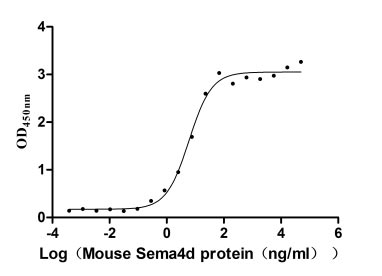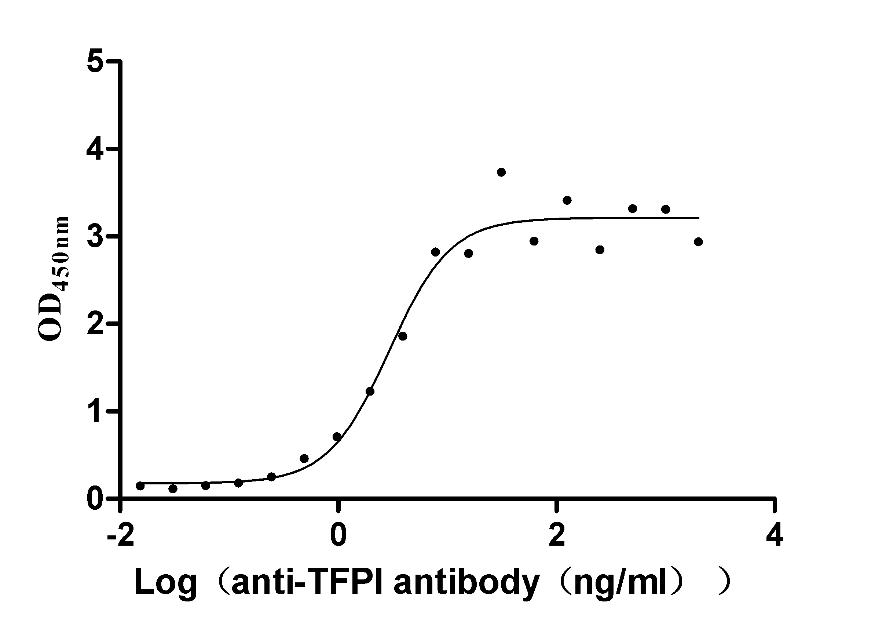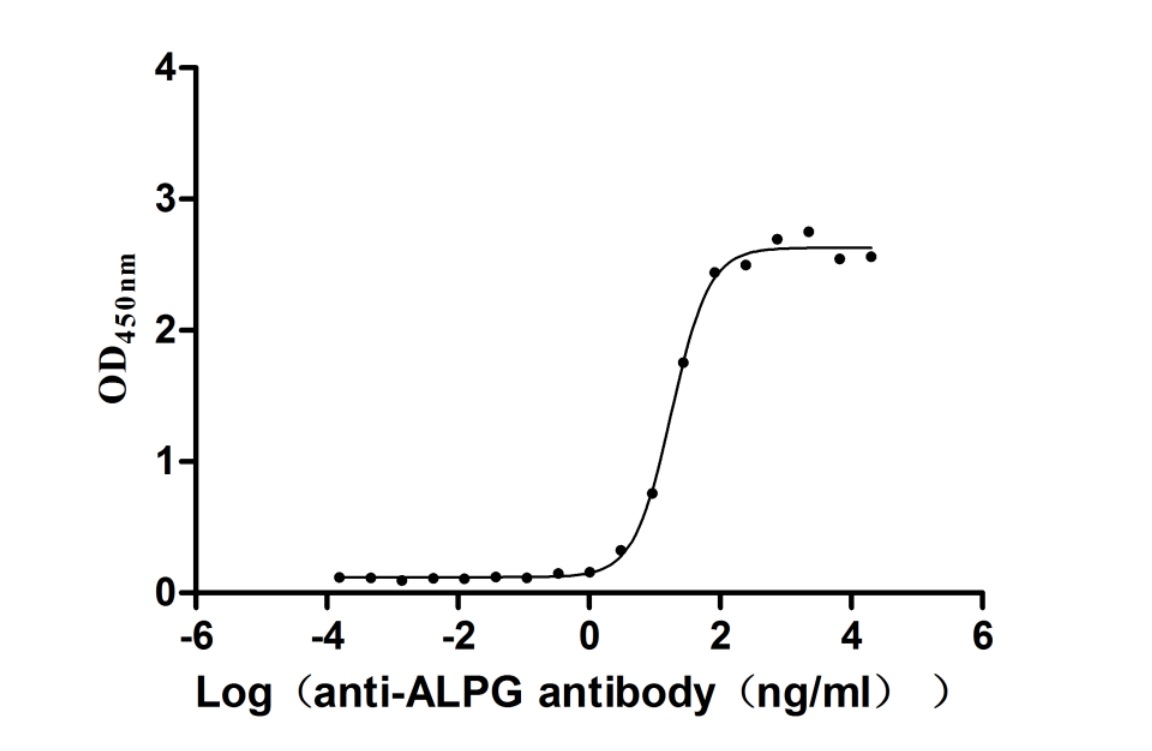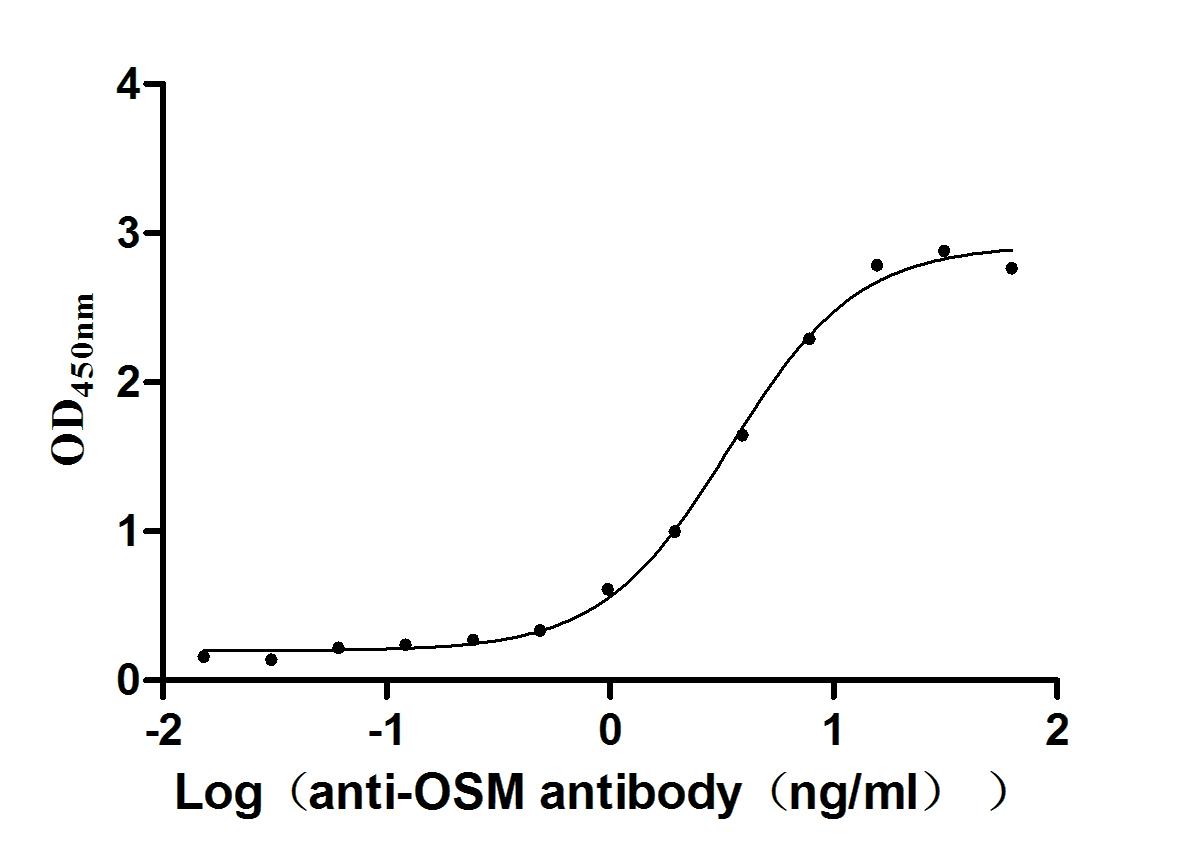Recombinant Human Stanniocalcin-2 (STC2)
-
货号:CSB-YP022822HU
-
规格:
-
来源:Yeast
-
其他:
-
货号:CSB-EP022822HU
-
规格:
-
来源:E.coli
-
其他:
-
货号:CSB-EP022822HU-B
-
规格:
-
来源:E.coli
-
共轭:Avi-tag Biotinylated
E. coli biotin ligase (BirA) is highly specific in covalently attaching biotin to the 15 amino acid AviTag peptide. This recombinant protein was biotinylated in vivo by AviTag-BirA technology, which method is BriA catalyzes amide linkage between the biotin and the specific lysine of the AviTag.
-
其他:
-
货号:CSB-BP022822HU
-
规格:
-
来源:Baculovirus
-
其他:
-
货号:CSB-MP022822HU
-
规格:
-
来源:Mammalian cell
-
其他:
产品详情
-
纯度:>85% (SDS-PAGE)
-
基因名:
-
Uniprot No.:
-
别名:Stanniocalcin 2; Stanniocalcin related protein; Stanniocalcin-2; Stanniocalcin-related protein; Stanniocalcin2; STC 2; STC related protein; STC-2; STC-related protein; STC2; STC2_HUMAN; STCRP
-
种属:Homo sapiens (Human)
-
蛋白长度:Full Length of Mature Protein
-
表达区域:25-302
-
氨基酸序列TDATNP PEGPQDRSSQ QKGRLSLQNT AEIQHCLVNA GDVGCGVFEC FENNSCEIRG LHGICMTFLH NAGKFDAQGK SFIKDALKCK AHALRHRFGC ISRKCPAIRE MVSQLQRECY LKHDLCAAAQ ENTRVIVEMI HFKDLLLHEP YVDLVNLLLT CGEEVKEAIT HSVQVQCEQN WGSLCSILSF CTSAIQKPPT APPERQPQVD RTKLSRAHHG EAGHHLPEPS SRETGRGAKG ERGSKSHPNA HARGRVGGLG AQGPSGSSEW EDEQSEYSDI RR
-
蛋白标签:Tag type will be determined during the manufacturing process.
The tag type will be determined during production process. If you have specified tag type, please tell us and we will develop the specified tag preferentially. -
产品提供形式:Lyophilized powder
Note: We will preferentially ship the format that we have in stock, however, if you have any special requirement for the format, please remark your requirement when placing the order, we will prepare according to your demand. -
复溶:We recommend that this vial be briefly centrifuged prior to opening to bring the contents to the bottom. Please reconstitute protein in deionized sterile water to a concentration of 0.1-1.0 mg/mL.We recommend to add 5-50% of glycerol (final concentration) and aliquot for long-term storage at -20℃/-80℃. Our default final concentration of glycerol is 50%. Customers could use it as reference.
-
储存条件:Store at -20°C/-80°C upon receipt, aliquoting is necessary for mutiple use. Avoid repeated freeze-thaw cycles.
-
保质期:The shelf life is related to many factors, storage state, buffer ingredients, storage temperature and the stability of the protein itself.
Generally, the shelf life of liquid form is 6 months at -20°C/-80°C. The shelf life of lyophilized form is 12 months at -20°C/-80°C. -
货期:Delivery time may differ from different purchasing way or location, please kindly consult your local distributors for specific delivery time.Note: All of our proteins are default shipped with normal blue ice packs, if you request to ship with dry ice, please communicate with us in advance and extra fees will be charged.
-
注意事项:Repeated freezing and thawing is not recommended. Store working aliquots at 4°C for up to one week.
-
Datasheet :Please contact us to get it.
相关产品
靶点详情
-
功能:Has an anti-hypocalcemic action on calcium and phosphate homeostasis.
-
基因功能参考文献:
- MiR-184 was confirmed to directly target STC2 in glioblastoma cells PMID: 28887636
- Results show that STC2 promotes head and neck squamous cell carcinoma cell proliferation, tumor growth, and metastasis through the PI3K/AKT/Snail pathway. PMID: 27863406
- STC2 promotes colorectal cancer tumorigenesis and epithelial-mesenchymal transition (EMT) progression through activating ERK/MEK and PI3K/AKT signaling pathways. PMID: 27662663
- Our results demonstrated the contrasting effects of STC1 and STC2-derived peptides on human macrophage foam cell formation associated with ACAT1 expression and on HASMC migration. PMID: 27346255
- Mus81 knockdown suppresses proliferation and survival of HCC cells likely by downregulating STC2 expression, implicating Mus81 as a therapeutic target for HCC. PMID: 27939696
- These findings indicated that STC2 may promote osteoblast differentiation and mineralization by regulating ERK activation PMID: 27878259
- STC2 is involved in regulating PAPP-A activity during the development of atherosclerosis PMID: 26983002
- Data suggest that stanniocalcin 1 and 2 (STC1, STC2) participate in inhibition of proteolytic activity of pregnancy-associated plasma protein-A (PAPP-A) during folliculogenesis. PMID: 26874357
- Up-regulation of CDK2 and CDK4 and down-regulation of cell cycle inhibitors p16 and p21 were observed after the delivery of STC2. Furthermore, STC2 transduction activated pAKT and pERK 1/2 signal pathways. PMID: 26424558
- This study utilized ER+ IBC to identify a metagene including ABAT and STC2 as predictive biomarkers for endocrine therapy resistance. PMID: 25771305
- STC2 may inhibit epithelial-mesenchymal transition at least partially through the PKC/Claudin-1-mediated signaling in human breast cancer cells. PMID: 25830567
- STC2 has a role in promoting cell proliferation and cisplatin resistance in cervical cancer PMID: 26361149
- The aim of this study was to evaluate the clinical value of measuring expression levels of STC2 in colorectal cancer (CRC) patients. PMID: 25234931
- Stanniocalcin 2 may contribute to tumor development and radioresistance in cervical cancer. PMID: 25674244
- These findings suggest that STC2 can be a potential lung cancer biomarker and plays a positive role in lung cancer metastasis and progression. PMID: 25463045
- Circulating STC1 and STC2 mRNA are potentially useful blood markers for LSCC PMID: 24743310
- High STC2 expression is associated with glioma. PMID: 24729417
- Interleukin-1-induced changes in the glioblastoma secretome suggest its role in tumor progression. PMID: 24503185
- STC2 overexpression correlates to poor prognosis for nasopharyngeal carcinomas. PMID: 24606961
- stanniocalcin 2 (STC2) was the most highly upregulated gene in anti-VEGF antibody-treated tumors PMID: 24375080
- Our results indicate that STC2 could be a useful molecular blood marker for predicting tumor progression by monitoring CTCs in patients with gastric cancer. PMID: 24100594
- Stanniocalcin-1 and -2 promote angiogenic sprouting in HUVECs via VEGF/VEGFR2 and angiopoietin signaling pathways. PMID: 23664860
- High STC2 expression levels are associated with disease recurrence in patients with gastric cancer. PMID: 23548070
- High STC2 expression is associated with lymph node metastasis in squamous cell/adenosquamous carcinomas and adenocarcinoma of gallbladder. PMID: 23906305
- STC2 is upregulated in hepatocellular carcinoma and promotes cell proliferation and migration. PMID: 23187001
- These findings point to three novel functions of STC2, and suggest that STC2 interacts with HO1 to form a eukaryotic 'stressosome' involved in the degradation of heme. PMID: 22503972
- High STC2 is associated with lymph node metastases in squamous cell esophageal carcinoma. PMID: 20734150
- Human stanniocalcin-1 or -2 expressed in mice reduces bone size and severely inhibits cranial intramembranous bone growth. PMID: 20174869
- High expression level of Stanniocalcin 2 is associated with gastric cancer. PMID: 20422456
- STC2 is a positive regulator in tumor progression at hypoxia. PMID: 20619259
- STC2 is a HIF-1 target gene and is involved in the regulation of cell proliferation. PMID: 19786016
- STC-2 can act as a potent growth inhibitor and reduce intramembranous and endochondral bone development and skeletal muscle growth, implying that these tissues are specific physiological targets of stanniocalcins PMID: 15367391
- Recombinant human and fish STC2 proteins were generated and found to be N-glycosylated homodimers. STC2 is a functional homodimeric glycoprotein, and thecal cell-derived STC2 could play a paracrine role during follicular development. PMID: 15486227
- NTN4, TRA1, and STC2 have roles in progression of breast cancer PMID: 17545519
- The induction of GDF15 and STC2 is likely specific to MK-4, vitamin K2 analog. PMID: 17909264
- elevated expression of STC-1 or STC-2 act as survival factors also for breast cancer cells and thereby contribute to tumor dormancy. PMID: 18355956
- STC2 was aberrantly hypermethylated in human cancer cells. PMID: 18394600
- Stanniocalcin 2 expression is regulated by hormone signalling and negatively affects breast cancer cell viability in vitro. PMID: 18492817
- stanniocalcin 2 overexpression in a prostate cancer cell line promoted prostate cancer cell growth, indicating its oncogenic property PMID: 19298603
- Increased STC2 gene expression is associated with colorectal cancer. PMID: 19415750
- Stanniocalcin 2 promotes invasion and is associated with metastatic stages in neuroblastoma. PMID: 19582875
显示更多
收起更多
-
亚细胞定位:Secreted.
-
蛋白家族:Stanniocalcin family
-
组织特异性:Expressed in a variety of tissues including muscle, heart, pancreas, kidney, spleen, prostate, small intestine, colon and peripheral blood leukocytes.
-
数据库链接:
HGNC: 11374
OMIM: 603665
KEGG: hsa:8614
STRING: 9606.ENSP00000265087
UniGene: Hs.233160
Most popular with customers
-
Recombinant Human Tumor necrosis factor ligand superfamily member 8 (TNFSF8), partial (Active)
Express system: Mammalian cell
Species: Homo sapiens (Human)
-
Recombinant Mouse Semaphorin-4D (Sema4d), partial (Active)
Express system: Mammalian cell
Species: Mus musculus (Mouse)
-
Recombinant Rabbit Tissue factor pathway inhibitor (TFPI) (Active)
Express system: Mammalian cell
Species: Oryctolagus cuniculus (Rabbit)
-
Recombinant Human Alkaline phosphatase, germ cell type (ALPG) (Active)
Express system: Mammalian cell
Species: Homo sapiens (Human)
-
Recombinant Human Oncostatin-M (OSM), partial (Active)
Express system: Mammalian cell
Species: Homo sapiens (Human)

















